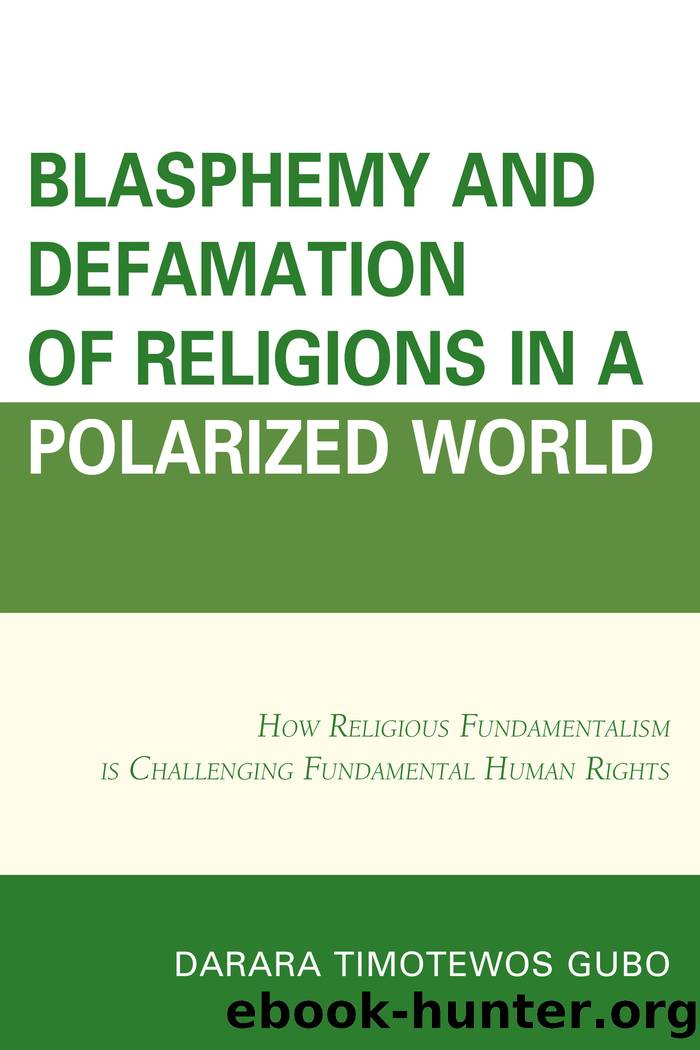Blasphemy And Defamation of Religions In a Polarized World by Gubo Darara Timotewos;

Author:Gubo, Darara Timotewos;
Language: eng
Format: epub
Tags: undefined
Publisher: Lexington Books
Published: 2012-08-15T00:00:00+00:00
Irish Blasphemy Law
Ireland is an interesting case study for the purpose of understanding blasphemy law. The legal basis for the criminalization of blasphemy in Ireland is article 40 (6) 1 of the Irish Constitution, which stipulates that âthe publication or utterance of blasphemous, seditious, or indecent matter is an offence which shall be punishable in accordance with the law.â[2] The fact that this constitutional section is part of the article which addresses the freedom of expression is indicative of the Irish authorityâs intention to make blasphemous publications or speeches an exception to the rule of freedom of expression.
Despite the constitutional provision outlawing blasphemy, there were no subsequent legislations that attempted to define its meaning. Though the Censorship of Films Act (1923) S.7 (2) and S.13 (1) of the Defamation Act of 1961 mentioned the existence of the crime, it did not define it in more detail. This means that despite its existence as criminal conduct, blasphemy was not defined under Irish law for decades.
The Irish constitutional blasphemy provision was put to the test in the case of Corway v. Independent Newspapers (Ireland).[3] This was a case that came before the Irish courts in the 1990s and illustrated a situation where the Irish judiciary was unable to apply the law on blasphemy.
In the case, a member of the Roman Catholic Church brought a charge against the editor and two proprietors of the weekly newspaper, the Sunday Independent, a newspaper with the largest readership in Ireland. On November 26, 1995, the newspaper published an article by Dr. Conor Cruise-OâBrien, which dealt with the divorce referendum held in a country with many followers of the Catholic Church. According to court record, the blasphemous allegation arose from a cartoon which accompanied the article. At the top of the cartoon were the words: âHello progressâbye bye Father?â The cartoon itself demonstrated a caricature of a priest who was carrying a trophy on his left hand and a host in his right hand. It seemed that the priest was delivering the host to three figures representing three well-known politicians: Prionsias de Rossa, Ruari Quinn and John Bruton.
The applicant alleged that the cartoon offended him and that he believed its caption was âcalculated to insult the feelings and religious convictions of readers generally by treating the sacrament of the Eucharist and its administration as objects of scorn and derision.â[4]
He had relied on Section 13.1 of the Defamation Act, 1961, which stipulates that:
Every person who composes, prints or publishes any blasphemous . . . libel shall, on conviction thereof on indictment, be liable to a fine not exceeding five hundred pounds or to imprisonment for a term not exceeding two years or to both such fine and imprisonment or to penal servitude for a term not exceeding seven years.[5]
Download
This site does not store any files on its server. We only index and link to content provided by other sites. Please contact the content providers to delete copyright contents if any and email us, we'll remove relevant links or contents immediately.
| Hadith | History |
| Law | Mecca |
| Muhammed | Quran |
| Rituals & Practice | Shi'ism |
| Sufism | Sunnism |
| Theology | Women in Islam |
The History of Jihad: From Muhammad to ISIS by Spencer Robert(2622)
Nine Parts of Desire by Geraldine Brooks(2361)
The Turkish Psychedelic Explosion by Daniel Spicer(2355)
The First Muslim The Story of Muhammad by Lesley Hazleton(2268)
The Essential Rumi by Coleman Barks(2043)
1453 by Roger Crowley(2024)
The Last Mughal by William Dalrymple(1855)
Trickster Travels: A Sixteenth-Century Muslim Between Worlds by Davis Natalie Zemon(1847)
Muhammad: His Life Based on the Earliest Sources by Martin Lings(1644)
God by Aslan Reza(1639)
by Christianity & Islam(1629)
A Concise History of Sunnis and Shi'is by John McHugo(1567)
No God But God by Reza Aslan(1541)
Magic and Divination in Early Islam by Emilie Savage-Smith;(1533)
The Flight of the Intellectuals by Berman Paul(1502)
Nothing to Envy by Barbara Demick(1445)
Art of Betrayal by Gordon Corera(1429)
What the Qur'an Meant by Garry Wills(1391)
Getting Jesus Right: How Muslims Get Jesus and Islam Wrong by James A Beverley & Craig A Evans(1340)
